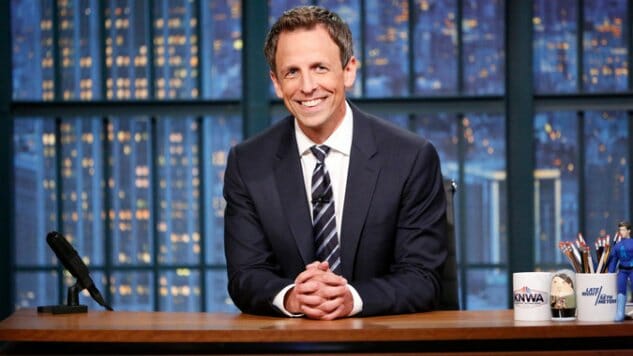The Pointless Changes of Late-Night
Seth Meyers photo courtesy of Lloyd Bishop / NBC Comedy Features
Have you watched The Daily Show with Trevor Noah since it returned from its holiday hiatus? If you have, you have probably noticed some changes. In particular, the show now begins with a cold open, a little preview of things to come from Noah as he walks about the stage. Perhaps you shall see the audience. Then, the new theme song plays. It’s basically the same song as the original, but with some heavier drums from Timbaland.
What is the point of all this? Well, there is no point, and that’s the problem. One could make an argument for there being a point, but it would be a point so meaningless and trivial as to only be, by technicality, a point. It’s a needless, barely tangible shakeup, solely done to avoid accusations of stagnation. It is the hallmark of late-night television.
Noah’s new little intros provide nothing of value. Frankly the new format works less well than going straight into the opening credits. It is different, though. “Look! A new thing,” the show can point out, but it’s a change for the sake of change. However, and unfortunately, such changes will generate traction on the internet. There will be blog posts and tweets. Entertainment websites looking to generate stories will be glad to throw together short news blasts. “Watch Trevor Noah walk around and maybe also stand a bit,” they can say, although they’d probably try and perk it up a bit.
The Daily Show with Trevor Noah is not the first, nor the last, late-night show to engage in pointless, marginal change for the sake of change. Perhaps the most pertinent embodiment of this, in current memory, is Late Night with Seth Meyers. One day, Seth Meyers came out onto the stage and, in lieu of hitting his mark and delivering his monologue he sat down and… actually, let’s take a moment to discuss late-night monologues first.
There are a lot of people who are weirdly preoccupied with late-night monologues, and in particular dismissing late-night monologues. Not just dumb people on the internet who like to complain about things, either. Seemingly reasonable people, professional TV writers who tend to have well-thought out opinions, have an inexplicable bee in their bonnet about monologues. They don’t like them because… people stand up and tell jokes. This is, literally, the only plausible explanation. They find the idea of somebody standing and telling topical jokes to be so odious as to be something that must be destroyed. Other jokes, including topical ones, are, apparently, fine. It’s the context of them being delivered in a monologue format, which is barely discernible from other formats, that drives them up a wall. Truly, it is nuts.
It is also an example of why TV shows probably feel the need to shake things up, even subtly. Even unnecessarily. If people are going to bitch and moan because you tell monologue jokes, what sort of nonsense are you up against? Perhaps these people would be mollified by something as simple as sitting down. This seems to be what happened with Seth Meyers. Meyers decided to just go right over to his desk and tell monologue jokes. He is, truly, doing the same thing he was doing before. He is telling topical jokes, like in any monologue, but he is sitting down, and he has some visual aids.
The difference is negligible. Yet, what happened? He got news coverage for telling jokes sitting down. He got commended for shaking things up… for sitting down. All it took was the simple act of taking a seat, and Late Night with Seth Meyers was credited for shaking up the paradigm of late-night television. Meyers got his show a ton of coverage it would not have otherwise gotten simply for doing what he did every week on Saturday Night Live for years. When something like this can happen, why wouldn’t you make marginal, banal changes if it can get you some attention?
Late-night television, obnoxious people will happily tell you, is a medium of a bygone era. It’s only relevance now is in pandering to the internet with viral clips to be watched the next day, they say. It’s all about throwing pies at Jennifer Lawrence or whatever nonsense they are up to these days. If something as simple as a little change to your set, or your theme song, or the way you open your show, can garner some clicks and some eyeballs, it’s almost a necessity to make minor changes here and there. You have nothing to lose.
From an intellectual point of view, the rearranging of the deck chairs that has become a part of late-night television is very silly and utterly pointless. If you want to make a true change, go for it. A show should not feel boxed in by the traditions of the medium. However, they should equally not feel the need to just make changes because people on the internet would complain if they didn’t. Tell your monologue jokes. You’re a comedy show, and if people are going to complain about the position of your body when you tell jokes, you can’t win with them. These little shake ups, these little blips of change that strain the definition of change, have a transparency to them that will always ring hollow, that will always appear pointless. If you are going to make a change, then make a change. Watching Trevor Noah walking around on the set to tell me about a show I’m already going to watch just doesn’t cut it.
Chris Morgan is not the author of THE book on Mystery Science Theater 3000, but he is the author of A book on Mystery Science Theater 3000. He’s also on Twitter.